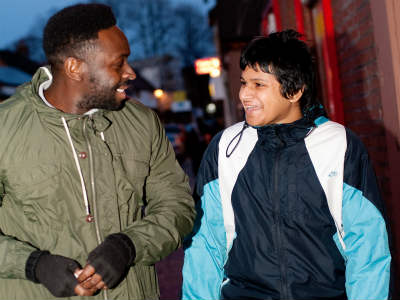
Social workers need training in “cultural competence” to ensure learning disabled people from black and minority ethnic (BME) get the support they need, a study has concluded.
Professionals needed to have an awareness of families’ cultural practices and norms, particularly to ensure assessments identified the needs of service users from BME backgrounds, the Foundation for People with Learning Disabilities said.
Today, the foundation reported on its Reaching Out project, commissioned by the Department of Health, which examined access to support for BME learning disabled people and their families in three areas.
The research found that families needed support to understand what they were entitled to, negotiate the system, speak up where they were dissatisfied with services and, in some cases, access translation and interpretation support. However, families said that staff from statutory agencies did not provide them with the information they needed, were too reactive and did not follow up on agreed actions.
| Tips for working with BME learning disabled people
|
It said building trust between professionals and families was essential but families felt staff moved on too quickly before this could be developed and lacked necessary cultural knowledge. The foundation said social care staff should receive mandatory and regular training in cultural competence, and produced an accompanying guide to culturally competent practice with a series of tips on how social workers should work with service users from BME backgrounds and their families.
The report also called for action to ensure BME learning disabled people could benefit from personalisation, particularly by helping family carers to understand how personal budgets worked, for instance through carer consultation meetings, and using self-assessments to identify people’s cultural needs.
The study also said local community organisations often provided service users and their families with the flexible and tailored support that they needed; however, the development or sustainability of these groups were not helped by trends in council commissioning to procure services from fewer, larger providers.
“Such organisations and key staff (often volunteers) should then be protected and sustained by the statutory agencies,” the report said. “In particular they should not be passed over by procurement processes that favour large scale organisations without community roots.”
Mithran Samuel is Community Care’s adults’ editor.Find out more on Community Care Inform
See our country profiles for detailed information on customs to inform your practice with families from overseas
Guide to using interpreters
Related articlesSocial work in diverse Britain


 Bournemouth, Christchurch and Poole
Bournemouth, Christchurch and Poole  Hampshire County Council
Hampshire County Council  Lincolnshire County Council
Lincolnshire County Council  Norfolk County Council
Norfolk County Council  Northamptonshire Children’s Trust
Northamptonshire Children’s Trust  South Gloucestershire Council
South Gloucestershire Council  Wiltshire Council
Wiltshire Council  Wokingham Borough Council
Wokingham Borough Council  Children and young people with SEND are ‘valued and prioritised’ in Wiltshire, find inspectors
Children and young people with SEND are ‘valued and prioritised’ in Wiltshire, find inspectors  How specialist refugee teams benefit young people and social workers
How specialist refugee teams benefit young people and social workers  Podcast: returning to social work after becoming a first-time parent
Podcast: returning to social work after becoming a first-time parent  Podcast: would you work for an inadequate-rated service?
Podcast: would you work for an inadequate-rated service?  Family help: one local authority’s experience of the model
Family help: one local authority’s experience of the model  Workforce Insights – showcasing a selection of the sector’s top recruiters
Workforce Insights – showcasing a selection of the sector’s top recruiters 

 Facebook
Facebook X
X LinkedIn
LinkedIn Instagram
Instagram
Comments are closed.